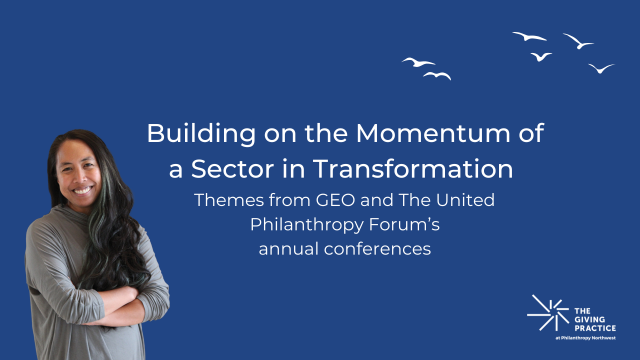As a six-state network of community, family, independent and corporate foundations, Philanthropy Northwest has the challenging task of creating programs, conferences and trainings for a range of stakeholders. We learn from each other, our members and partners, including Funders for LGBTQ Issues, which reached out to me to join its Funding Forward 2017 conference planning committee last fall. I was honored to work with such an incredible group of people, helping plan what turned out to be one of the best conferences I’ve ever attended.
The March 29-31 conference took place in Seattle and incorporated our region's philanthropic values and vision, including a session on The State of LGBTQ Philanthropy In the Northwest. Though LGBTQ issues continue to disproportionally go unfunded nationwide, we recognized strong investments from Philanthropy Northwest's network, including Pride Foundation, Meyer Memorial Trust and Social Justice Fund Northwest listed among the top 10 funders for LGBTQ communities in our region.
The conference drew national attendance. It was exciting to learn that community foundations are also increasing their funding in LGBTQ issues, and to hear great stories and perspectives from foundations from outside our region — further validating that though each of our communities are vastly different from each other, there is always opportunity to learn from one another.
Summarizing my takeaways from the conference is a challenge, since I felt like every interaction I had, whether a session or during a break, was so thoughtful and I learned so much. I also cried and laughed a lot! Below is my attempt to share what surfaced for me.
- Create spaces for people to do their work. Funders were encouraged to engage in more capacity-building, unrestricted and general operating support. These overlapping support strategies give nonprofits the flexibility they need to be nimble and responsive to challenges and opportunities that arise. They also give funders the freedom to truly listen and trust that nonprofits know how to invest in themselves and the communities they serve. Furthermore, the strategies allow nonprofit grantees to be more accountable to communities and not just to funders. Restricted funding equals restricted framework. Many of the issues nonprofits are tackling are complex. Capacity building is about funding stronger movements.
- Invest in social justice. Donors can be activists and activists can be donors. Fund at the intersections centering people most affected by the issues. Social justice, equitable funding means giving equal funding to partners, especially grassroots organizations and giving multiyear funding.
- Rapid response funding. While we often appreciate philanthropy's ability to provide patient capital over the long run, as disasters and unanticipated crises strike, funders can respond to volatile community needs. We are seeing examples of this from Pride Foundation, Social Justice Fund Northwest and Grantmakers Concerned With Immigrants and Refugees.
- Support the ecosystem! Beyond grantmaking, philanthropy can support ongoing policy and advocacy efforts; organizing and building movements; and supporting cultural competency for "mainstream" service providers.
I've heard many of these suggestions throughout the sector, but was grateful to see those solidified in a conference full of leaders in the sector. The Funding Forward 2017 conference concluded with the inspirational message, "Philanthropy reveals the beauty in all of us. As we do our work, our core purpose is to reveal that beauty." As we consider Philanthropy Northwest's upcoming programs and opportunities to engage, we welcome you all to challenge us to bring more of these issues to the top, including session proposals for Philanthropy Northwest's 2017 conference, Now Is the Time to Lead Through Change. I also encourage you to look at your portfolio of work and see which of these suggestions would work for you. It may not seem grand — but it would be a great place to start.
Gloris Estrella is a program manager at Philanthropy Northwest. She can be reached at gestrella@philanthropynw.org.


